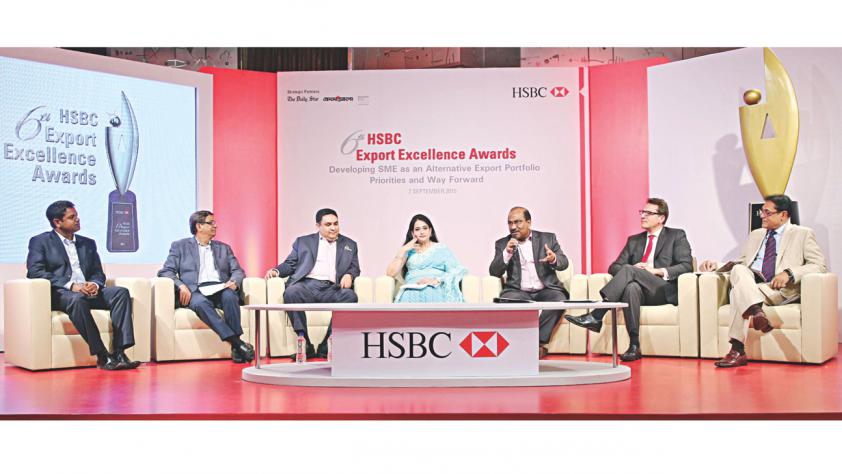SMEs can widen exports with policy support
HSBC hosts discussion to pinpoint what holds the sector back
Shitangshu Kumar Sur Chowdhury, deputy governor of Bangladesh Bank, speaks at a discussion titled "Developing SME as an alternative export portfolio: priorities and way forward" at the Westin hotel in Dhaka yesterday. HSBC Bangladesh organised the seminar.
Small and medium enterprises can play a key role in export diversification, given they are provided with the required support that will effectively help Bangladesh cut its overreliance on garments for foreign currencies.
"In most cases, we focus on large companies, but SMEs can play an important role in helping the country achieve its growth ambition,” said Francois de Maricourt, chief executive of HSBC Bangladesh.
Maricourt spoke at a panel discussion organised by HSBC Bangladesh on 'Developing SME as an Alternative Export Portfolio: Priorities and Way Forward' at the Westin Dhaka. Business leaders, exporters, experts and economists discussed the potential and challenges faced by the sector.
In Bangladesh, 95 percent of business houses are SMEs, accounting for about 45 percent of manufacturing value addition, 80 percent of industrial employment, 90 percent of industrial units and 25 percent of the labour force. Its total contribution to exports varies from 75 percent to 80 percent, according to different estimates.
But when it comes to exports, the country relies on garment, which accounts for 80 percent of overseas sales.
Selima Ahmad, president of Bangladesh Women Chamber of Commerce and Industry, said policymakers should look beyond the traditional sectors, be practical and meet the demands of the entrepreneurs in order to diversify exports.
"Entrepreneurs also have other limitations: they don't have money and technology. They need support in the areas of research and development."
The whole value chain has to be identified in order to fit women entrepreneurs in the system, as they do not know English or IT to promote their products, she added.
Matiur Rahman, editor of Prothom Alo, said his newspaper promotes SMEs and would continue to do more in the coming days. Funds should be given to SMEs that are not prone to defaulting on their loans, he added.
The government and the central bank have done a lot to promote SMEs in recent years, he said. "But there is scope to do more.”
Nazim Farhan Choudhury, director of GraphicPeople, an offshore production studio providing digital and print production services to some of the world's largest brands and advertising agencies, said the central bank should remove barriers so entrepreneurs can tap opportunities abroad.
For his company to succeed in overseas markets, the company needs to go abroad, advertise and market the products, he added.
"But we can't spend money abroad to promote our products and services because of the foreign currency rules."
"As a result, my company has had to partner with an external advertising agency; we produce the services and the foreign partner sells the services. I am getting a margin, but the partner company is getting a major share,” Choudhury said.
Shitangshu Kumar Sur Chowdhury, deputy governor of Bangladesh Bank, said the central bank has given importance to the SMEs since 2009 from a banking perspective, which was not seen in the preceding decade.
"We have set up a separate department at the central bank to promote SMEs. We have arranged low-cost funds for them. We are getting results for our efforts and today Bangladesh is a role model for SME development and financing."
The vulnerable SME industries need all sorts of support from the government and banks, he added.
Chowdhury, also a board member of SME Foundation, the state-run agency that promotes SMEs across the country, said the central bank's foreign exchange regulations are liberal enough in allowing exporters, small and large, to exploit their opportunities in overseas markets.
"Exporters can seek special permission if they have to spend more than the limit."
The deputy governor said the central bank has signed agreements with banks so they make most of the refinancing scheme in lending to entrepreneurs, SMEs and women entrepreneurs at subsidised rates.
Raisul Kabir, chief executive of Brain Station-23, a customised web and mobile application developer, said the local non-traditional sectors have to do a lot to sell a product abroad. "Here, we need policy support."
The discussion was part of the sixth HSBC Export Excellence Awards that will be awarded later this year. Companies can file nominations until September 17.
Other Posts
- Bank Asia organizes foundation training
- A Rouf Chowdhury, Chairman of Bank Asia Ltd, poses with the participants of 35th foundation training course at its training institute, Rangs Bhaban, in the city on Monday. Md Sazzad Hossain, Senior EVP, Md Azharul Islam, VP and Md Abdul Latif, VP of the b
- First Security Islami Bank's new DMD
- 32nd AGM of NBL held
- 223rd board meeting of SJIBL held
- BB plans to set 460 fake note detective machines





Comments